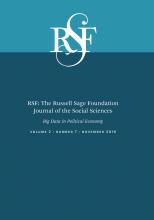Research Article
Open Access
Income, Ideology, and Representation
Chris Tausanovitch
RSF: The Russell Sage Foundation Journal of the Social Sciences November 2016, 2 (7) 33-50; DOI: https://doi.org/10.7758/RSF.2016.2.7.03
Chris Tausanovitch
aAssistant professor in the Department of Political Science at the University of California–Los Angeles

REFERENCES
- ↵Achen, Christopher H., and Larry M. Bartels. 2012. “Blind Retrospection: Why Shark Attacks Are Bad for Democracy.” Working paper. Nashville, TN: Vanderbilt University, Center for the Study of Democratic Institutions.
- The Annenberg Public Policy Center at the University of Pennsylvania. 2000. “2000 National Annenberg Election Survey.” http://www.annenbergpublicpolicycenter.org/political-communication/naes/ (accessed May 25, 2016).
- The Annenberg Public Policy Center at the University of Pennsylvania. 2004. “2004 National Annenberg Election Survey.” http://www.annenbergpublicpolicycenter.org/political-communication/naes/ (accessed May 25, 2016).
- Ansolabehere, Stephen. 2010a. “CCES, Common Content, 2006.” Harvard Dataverse, V4. http://hdl.handle.net/1902.1/14002 (accessed May 25, 2016).
- Ansolabehere, Stephen. 2010b. “CCES, Common Content, 2008.” Harvard Dataverse, V6. http://hdl.handle.net/1902.1/14003 (accessed May 25, 2016).
- Ansolabehere, Stephen. 2012. “CCES, Common Content, 2010.” Harvard Dataverse, V3. http://hdl.handle.net/1902.1/17705 (accessed May 25, 2016).
- ↵
- Ansolabehere, Stephen,
- Jonathan Rodden, , and
- James M. Snyder
- Ansolabehere, Stephen, Brian Schaffner. 2013. “CCES Common Content, 2012.” Harvard Dataverse, V8. http://hdl.handle.net/1902.1/21447 (accessed May 25, 2016).
- ↵Bartels, Larry M. 2009. Unequal Democracy: The Political Economy of the New Gilded Age. Princeton, N.J.: Princeton University Press.
- ↵Bhatti, Yosef, and Robert S. Erikson. 2011. “How Poorly Are the Poor Represented in the U.S. Senate?” In Who Gets Represented? edited by Peter K. Enns and Christopher Wlezien. New York: Russell Sage Foundation.
- ↵
- Black, Duncan
- ↵
- ↵
- Brambor, Thomas,
- William Roberts Clark, , and
- Matt Golder
- ↵
- Brunner, Eric,
- Stephen L. Ross, , and
- Ebonya Washington
- ↵Butler, Daniel M. 2014. Representing the Advantaged: How Politicians Reinforce Inequality. New York: Cambridge University Press.
- ↵Campbell, Angus, Philip E. Converse, Warren E. Miller, and Donald E. Stokes. 1966. The American Voter. New York: Wiley.
- ↵
- Caplin, Andrew, and
- Barry Nalebuff
- ↵
- Clinton, Joshua D
- ↵
- Clinton, Joshua,
- Simon Jackman, , and
- Douglas Rivers
- ↵
- Downs, Anthony
- ↵Fiorina, Morris P., and Samuel J. Abrams. 2012. Disconnect: The Breakdown of Representation in American Politics. Vol. 11. Norman: University of Oklahoma Press.
- ↵Gilens, Martin. 2012. Affluence and Influence: Economic Inequality and Political Power in America. Princeton, N.J.: Princeton University Press.
- ↵
- Gilens, Martin, and
- Benjamin I. Page
- ↵Hacker, Jacob S., and Paul Pierson. 2011. Winner-Take-All Politics: How Washington Made the Rich Richer—and Turned Its Back on the Middle Class. New York: Simon & Schuster.
- ↵
- Hill, Seth J., and
- Chris Tausanovitch
- ↵Lewis, Jeffrey B., and Chris Tausanovitch. 2013. “Has Joint Scaling Solved the Achen Objection to Miller and Stokes?” Working paper. Los Angeles: University of California, Department of Political Science.
- ↵Poole, Keith T., and Howard Rosenthal. 1997. Congress: A Political-Economic History of Roll Call Voting. New York: Oxford University Press.
- ↵
- Schofield, Norman
- ↵
- Tausanovitch, Chris, and
- Christopher Warshaw
- ↵Tausanovitch, Chris, and Christopher Warshaw. 2014. “Do Legislator Positions Affect Constituent Voting Decisions in U.S. House Elections?” Unpublished paper. University of California, Los Angeles, and Massachusetts Institute of Technology, Cambridge, Mass.
- ↵Zaller, John. 1992. The Nature and Origins of Mass Opinion. New York: Cambridge University Press.
In this issue
Income, Ideology, and Representation
Chris Tausanovitch
RSF: The Russell Sage Foundation Journal of the Social Sciences Nov 2016, 2 (7) 33-50; DOI: 10.7758/RSF.2016.2.7.03





